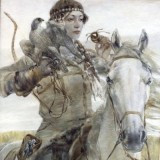Life of a Poet #2 - Elizabeth Browning
-
Italian Stallion
14 years agoOkay, time for round two. Elizabeth Browning...you all know what to do, can't wait to see what you all say/type.
`````````````````````````
How do I love thee? Let me count the ways.
By: Elizabeth Browning
How do I love thee? Let me count the ways.
I love thee to the depth and breadth and height
My soul can reach, when feeling out of sight
For the ends of Being and ideal Grace.
I love thee to the level of everyday's
Most quiet need, by sun and candle-light.
I love thee freely, as men strive for Right;
I love thee purely, as they turn from Praise.
I love thee with a passion put to use
In my old griefs, and with my childhood's faith.
I love thee with a love I seemed to lose
With my lost saints, --- I love thee with the breath,
Smiles, tears, of all my life! --- and, if God choose,
I shall but love thee better after death.
`````````````````````````
"How Do I Love Thee? Let Me Count the Ways" which is also know as, "Sonnet 43" expresses Browning's passionate affection for Robert Browning whom is also a poet and in this case her future husband when she originally wrote this poem. The amount of love portrayed is too much to just name, therefore she needed to count the ways in which she loves him.
Her adoration for him (being Robert Browning) is very realistic. Breadth means width, which is a measurement of how far her love for him truly is. Height and depth represents how far below she would travel and how high up she would travel to display her love for him. These measurements although physical in relation to her, are spiritual as well, since they pertain to her soul; she states that her love rises to a vast sacred intensity (which is displayed in lines 3 and 4). The physical and spiritual measurement is of her soul and the extraordinary spirit of her individual self to the very ends of her life.
"Ideal Grace" is capitalized which most likely refers to God, and his most precious gift - Salvation, and the chance to experience everlasting love and happiness in his company. Her adoration for her husband resembles that of the love of God. Her affection for Robert Browning has the same level of need as day-to-day life; we need water, food, oxygen, etc. to be able to live life.
She feels affection for him with her own willpower, along without requirement to do so. This is the type of devotion that is generously given without any intimidation, force or threatening measures. Humility turns from praise for the reason that it desires it not to exist. She feels affection for her husband for the sake of love itself, and not to accept any praise. Passion is set to utilize her aged anguish in which that passion hurts, since it reminds her in the course of soreness that she is still living. The identical passion stays alive in the assurance of a kid whom trusts with no hesitation for the reason of deficient life experiences of those opposing the child.
Elizabeth Browning loves Robert Browning with the love individuals experience for the duration of their inexperienced formative years, which she misplaced with her inexperience, and feels it yet again for him. She adores him with every single breath she takes, along with the bliss and grief of her very existence. Furthermore, she expects to maintain her adoration for him after passing away.
Overall her love exceeds any expectations; the love she holds is close and dear to her heart which in return blossoms to become a beautiful and precious relationship. Her adoration for Robert Browning was extreme in many ways, her love for him was too much to name signally alone therefore, she needed to count the different ways in which she portrayed her love for him. -
silvershoes
14 years agoI've never liked this poem. I read it for the first time in years a couple days ago and re-realized that I don't like it. Funny it's what's been picked to start up the second Life of a Poet, haha!
I dislike the repetition. It resembles a children's lullaby, but without the intent. The title is ostentatious and the content is affected. I'm sure it was a lovely poem back whenever Browning wrote it... but to me, it's not the type of poem that withstands time. It's warped rather fully into a boring cliche.
Don't take my opinion personally!
I'll go look for a poem by Browning that I like. There's got to be one out there. -
debbylyn
14 years agoSonnets From The Portuguese
VI
Go from me. Yet I feel that I shall stand
Henceforth in thy shadow. Nevermore
Alone upon the threshold of my door
Of individual life, I shall command
The uses of my soul, nor lift my hand
Serenely in the sunshine as before,
Without the sense of that which I forbore--
Thy touch upon the palm. The widest land
Doom takes to part us, leaves thy heart in mine
With pulses that beat double. What I do
And what I dream include thee, as the wine
Must taste of its own grapes. And when I sue
God for myself, He hears that name of thine,
And sees within my eyes the tears of two.
I love the above poem....it contains all the emotion and passion of true love....It was written in a very different time...she loved him very much..
I always liked the first poem as well...as Britt said...it's poetry and I find it hard to dislike it as such... -
Ingrid
14 years agoLol, perhaps, yes..but very few people have a mind that is really open. Even at a young age, people tend to play it safe, and opening yourself up to new experiences/ views is considered very dangerous to many, many people. If we would truly try to see things through the eyes of others then this world would be more united and a better place too.
-
Ingrid
14 years agoThis poem I picked is long, but it is worth your time. As you read, you will start to wonder why the children are unhappy..and at the end you will know that in many parts of this world there are still millions who cry for the very same reason. If I could make a wish, it would be for each child to grow up with equal chances and a good home. As a mother, this poem made me cry, as a former child to two people it brought back horrid memories of a ball and chain I will never get rid of.
The Cry Of The Children
Do ye hear the children weeping, O my brothers,
Ere the sorrow comes with years?
They are leaning their young heads against their mothers---
And that cannot stop their tears.
The young lambs are bleating in the meadows;
The young birds are chirping in the nest;
The young fawns are playing with the shadows;
The young flowers are blowing toward the west---
But the young, young children, O my brothers,
They are weeping bitterly!---
They are weeping in the playtime of the others
In the country of the free.
Do you question the young children in the sorrow,
Why their tears are falling so?---
The old man may weep for his to-morrow
Which is lost in Long Ago---
The old tree is leafless in the forest---
The old year is ending in the frost---
The old wound, if stricken, is the sorest---
The old hope is hardest to be lost:
But the young, young children, O my brothers,
Do you ask them why they stand
Weeping sore before the bosoms of their mothers,
In our happy Fatherland?
They look up with their pale and sunken faces,
And their looks are sad to see,
For the man's grief abhorrent, draws and presses
Down the cheeks of infancy---
"Your old earth," they say, "is very dreary;"
"Our young feet," they say, "are very weak!
Few paces have we taken, yet are wearyÑ
Our grave-rest is very far to seek.
Ask the old why they weep, and not the children,
For the outside earth is cold,---
And we young ones stand without, in our bewildering,
And the graves are for the old.
"True," say the young children, "it may happen
That we die before our time.
Little Alice died last year---the grave is shapen
Like a snowball, in the rime.
We looked into the pit prepared to take her---
Was no room for any work in the close clay:
From the sleep wherein she lieth none will wake her
Crying, 'Get up, little Alice! it is day.'
If you listen by that grave, in sun and shower,
With your ear down, little Alice never cries!---
Could we see her face, be sure we should not know her,
For the smile has time for growing in her eyes---
And merry go her moments, lulled and stilled in
The shroud, by the kirk-chime!
It is good when it happens," say the children,
"That we die before our time."
Alas, alas, the children! they are seeking
Death in life, as best to have!
They are binding up their hearts away from breaking,
With a cerement from the grave.
Go out, children, from the mine and from the city---
Sing out, children, as the little thrushes do---
Pluck your handfuls of the meadow-cowslips pretty---
Laugh aloud, to feel your fingers let them through!
But they answer, "Are your cowslips of the meadows
Like our weeds anear the mine?
Leave us quiet in the dark of the coal-shadows,
From your pleasures fair and fine!
"For oh," say the children, "we are weary,
And we cannot run or leap---
If we cared for any meadows, it were merely
To drop down in them and sleep.
Our knees tremble sorely in the stooping---
We fall upon our faces, trying to go;
And, underneath our heavy eyelids drooping,
The reddest flower would look as pale as snow.
For, all day, we drag our burden tiring,
Through the coal-dark, underground---
Or, all day, we drive the wheels of iron
In the factories, round and round.
"For, all day, the wheels are droning, turning,---
Their wind comes in our faces,---
Till our hearts turn,---our head, with pulses burning,
And the walls turn in their places---
Turns the sky in the high window blank and reeling---
Turns the long light that droppeth down the wall---
Turn the black flies that crawl along the ceiling---
All are turning, all the day, and we with all.---
And, all day, the iron wheels are droning;
And sometimes we could pray,
'O ye wheels,' (breaking out in a mad moaning)
'Stop! be silent for to-day!' "
Ay! be silent! Let them hear each other breathing
For a moment, mouth to mouth---
Let them touch each other's hands, in a fresh wreathing
Of their tender human youth!
Let them feel that this cold metallic motion
Is not all the life God fashions or reveals---
Let them prove their inward souls against the notion
That they live in you, os under you, O wheels!---
Still, all day, the iron wheels go onward,
Grinding life down from its mark;
And the children's souls, which God is calling sunward,
Spin on blindly in the dark.
Now, tell the poor young children, O my brothers,
To look up to Him and pray---
So the blessed One, who blesseth all the others,
Will bless them another day.
They answer, "Who is God that He should hear us,
White the rushing of the iron wheels is stirred?
When we sob aloud, the human creatures near us
Pass by, hearing not, or answer not a word!
And we hear not (for the wheels in their resounding)
Strangers speaking at the door:
Is it likely God, with angels singing round Him,
Hears our weeping any more?
"Two words, indeed, of praying we remember,
And at midnight's hour of harm,---
'Our Father,' looking upward in the chamber,
We say softly for a charm.
We know no other words except 'Our Father,'
And we think that, in some pause of angels' song,
God may pluck them with the silence sweet to gather,
And hold both within His right hand which is strong.
'Our Father!' If He heard us, He would surely
(For they call Him good and mild)
Answer, smiling down the steep world very purely,
'Come and rest with me, my child.'
"But no!" say the children, weeping faster,
"He is speechless as a stone;
And they tell us, of His image is the master
Who commands us to work on.
Go to!" say the children,---"Up in Heaven,
Dark, wheel-like, turning clouds are all we find.
Do not mock us; grief has made us unbelieving---
We look up for God, but tears have made us blind."
Do you hear the children weeping and disproving,
O my brothers, what ye preach?
For God's possible is taught by His world's loving---
And the children doubt of each.
And well may the children weep before you;
They are weary ere they run;
They have never seen the sunshine, nor the glory
Which is brighter than the sun:
They know the grief of man, but not the wisdom;
They sink in man's despair, without its calm---
Are slaves, without the liberty in Christdom,---
Are martyrs, by the pang without the palm,---
Are worn, as if with age, yet unretrievingly
No dear remembrance keep,---
Are orphans of the earthly love and heavenly:
Let them weep! let them weep!
They look up, with their pale and sunken faces,
And their look is dread to see,
For they mind you of their angels in their places,
With eyes meant for Deity;---
"How long," they say, "how long, O cruel nation,
Will you stand, to move the world, on a child's heart,
Stifle down with a mailed heel its palpitation,
And tread onward to your throne amid the mart?
Our blood splashes upward, O our tyrants,
And your purple shows yo}r path;
But the child's sob curseth deeper in the silence
Than the strong man in his wrath!" -
silvershoes
14 years agoQuite a read. I only meant to read the first stanza but I soon read the whole poem.
Ah, Browning does have something to move me :)
"But the young, young children, O my brothers,"
^
Alex DeLarge, anyone? Can't help it... I read the book recently.




